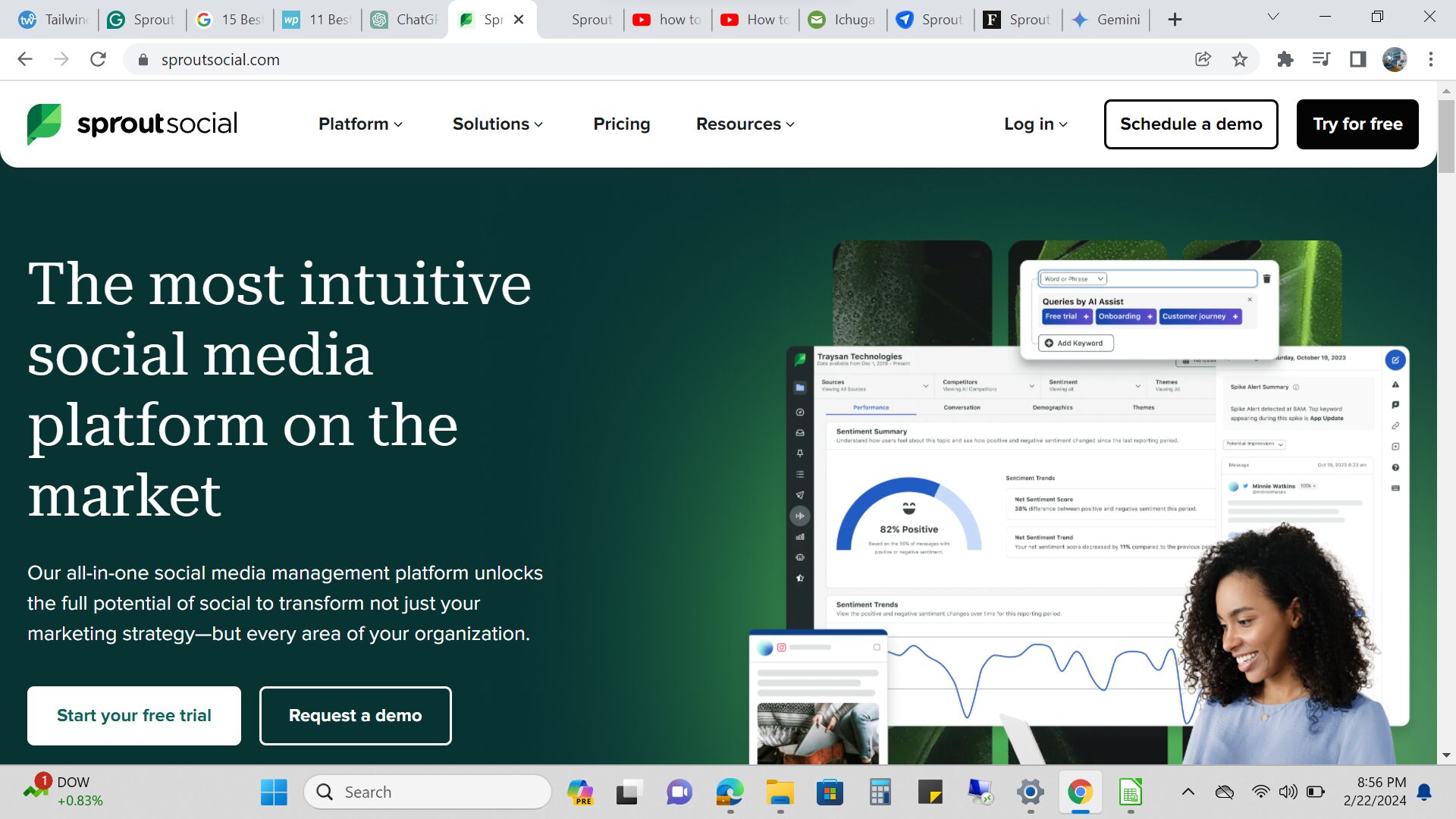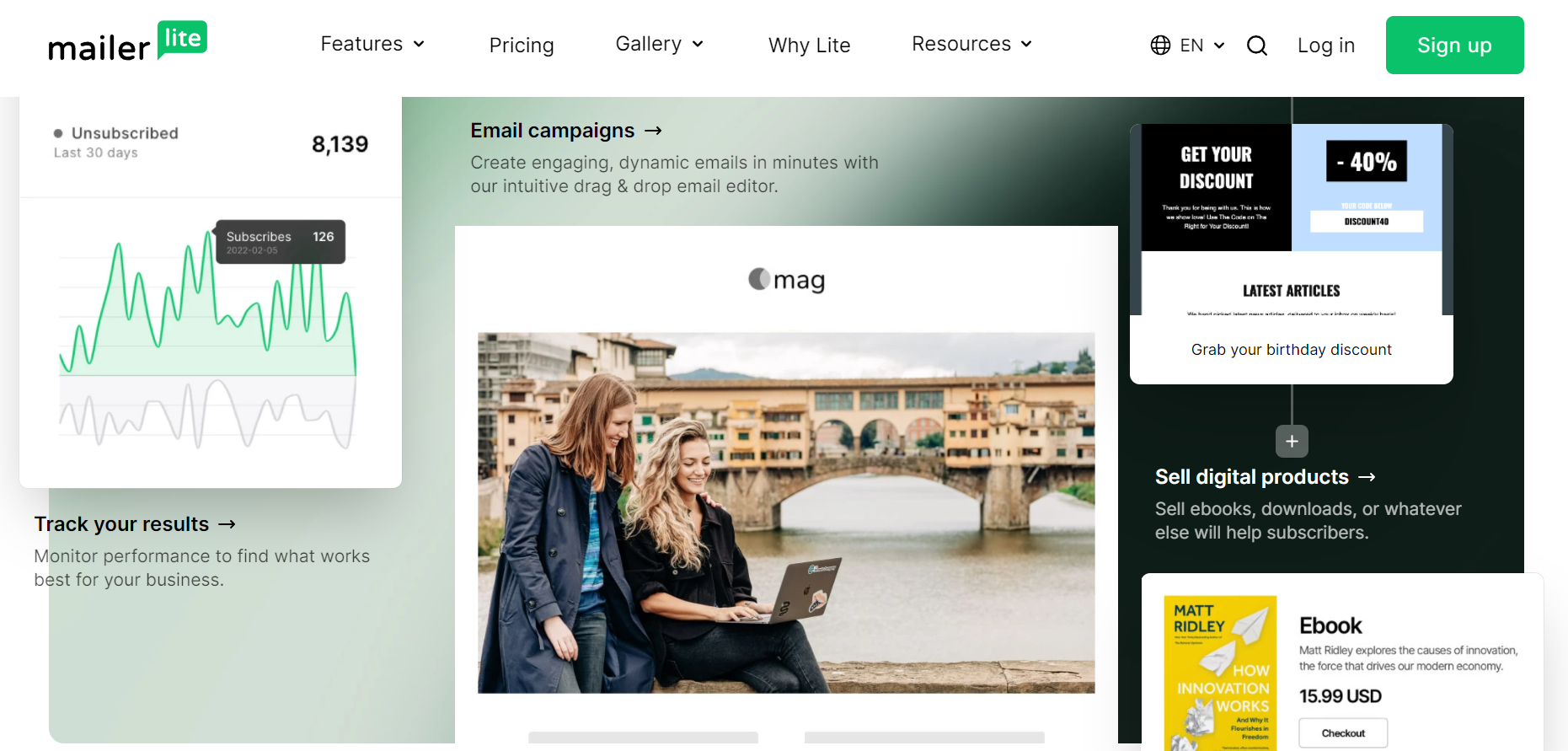In the rapidly evolving digital landscape, e-commerce has become the driving force behind modern retail. For businesses aspiring to establish a thriving online store, selecting the right e-commerce platform is a critical decision. The plethora of options available can be overwhelming, making it essential to understand the key features and strengths of each platform. In this comprehensive guide, we will explore the top ecommerce platforms that have earned their reputation for excellence, helping you make an informed choice to kickstart your online business journey.
What is an ecommerce platform?
An ecommerce platform is a software application that powers online stores. It manages the entire process of selling products or services online, from product listings and inventory management to payment processing and order fulfillment.
Most popular features to check for include:
- Display products: This includes adding product descriptions, photos, and videos.
- Process orders: This involves managing shopping carts, checkout, and payment processing.
- Fulfill orders: This includes packaging and shipping products to customers.
- Manage customers: This involves creating customer accounts, tracking orders, and providing customer support.
- Marketing and promotions: This includes creating targeted ads, running email campaigns, and offering discounts.
What to consider when selecting an ecommerce platform?
Selecting the best ecommerce platform for your business is a critical decision that can significantly impact your online success. To make an informed choice, you should consider the following factors:
1. Business Needs:
Understand your specific requirements and goals. Consider factors such as the size of your business, the number of products you offer, your target audience, and your growth projections. Different platforms cater to different business sizes and niches.
2. Ease of Use:
The platform should be user-friendly and intuitive, allowing you to manage your online store efficiently without extensive technical knowledge. Look for drag-and-drop interfaces, customizable templates, and straightforward navigation.
3. Customization and Design:
Assess the platform’s design options and flexibility. Ensure that you can customize the appearance of your store to match your brand identity and create a unique shopping experience for your customers.
4. Mobile Responsiveness:
With a significant portion of online shopping happening on mobile devices, it’s essential that the platform offers a responsive design that adapts to various screen sizes and devices.
5. Payment Gateway Integration:
Check if the platform supports multiple payment gateways to provide convenient payment options for your customers. Also, consider transaction fees and any additional costs associated with payment processing.
6. Security:
Security is crucial for any ecommerce business. Ensure that the platform complies with industry security standards and offers SSL encryption to protect customer data during transactions.
7. Scalability:
Consider the platform’s ability to handle increased traffic and product catalogs as your business grows. It should be able to accommodate higher demands without compromising performance.
8. SEO Features:
Look for ecommerce platforms that offer built-in SEO tools or easy integration with popular SEO plugins. Good SEO practices are essential for driving organic traffic and improving your online visibility.
9. Integrations and Add-ons:
Check the platform’s compatibility with third-party integrations and extensions that can enhance your store’s functionality. Common integrations include marketing tools, analytics, shipping solutions, and inventory management systems.
10. Customer Support:
Reliable customer support is crucial in case you encounter technical issues or need assistance with the platform. Look for a platform that offers responsive support through various channels, such as email, live chat, or phone.
11. Pricing and Fees:
Compare the pricing models of different platforms, including monthly subscriptions, transaction fees, and additional costs for add-ons. Ensure that the platform’s pricing aligns with your budget and provides good value for money.
12. Performance and Speed:
A fast-loading and responsive website are essential for providing a positive user experience. Opt for a platform with strong server infrastructure and a content delivery network (CDN) to ensure quick page loading times.
13. Reviews and Reputation:
Research customer reviews and feedback about the platform to gauge the experiences of other users. Pay attention to common praises and criticisms to identify potential issues or strengths.
By carefully evaluating these factors, you can make an informed decision and choose the best ecommerce platform that aligns with your business needs and goals. Remember that each platform has its own strengths and weaknesses, so it’s essential to find one that best suits your unique requirements.
What are the 10 Best Ecommerce Platforms?
1. Shopify
2. WooCommerce
3. BigCommerce
4. Magento
5. Wix
6. Squarespace
7. Volusion
8. 3dcart
9. PrestaShop
10. OpenCart
1. Shopify: The Ultimate Ecommerce Solution
Shopify is a leading ecommerce platform that has revolutionized the way businesses sell their products online. With its user-friendly interface, robust features, and extensive app ecosystem, Shopify makes it easy for entrepreneurs to set up and manage their online stores. Whether you’re a small startup or an established enterprise, Shopify caters to all business sizes.
Key Features of Shopify:
1. Easy Store Setup: Shopify’s drag-and-drop interface allows you to create a stunning online store without any technical knowledge.
2. Secure and Reliable: Shopify provides secure hosting, automatic backups, and reliable performance, ensuring your store stays operational at all times.
3. Mobile-Optimized: With a responsive design, Shopify stores look great on all devices, providing an excellent user experience to customers.
4. App Integration: Access to a vast app store allows you to enhance your store’s functionality and customize it to meet specific business needs.
5. Payment Gateway Options: Shopify supports multiple payment gateways, making it convenient for customers to make transactions.
6. 24/7 Customer Support: Shopify offers round-the-clock customer support to help you with any technical issues or questions.
2. WooCommerce: Empowering WordPress Ecommerce
WooCommerce is a popular open-source ecommerce plugin designed for WordPress websites. It seamlessly integrates with WordPress, providing users with a familiar interface and a wide range of customization options. WooCommerce is an excellent choice for businesses already using WordPress as their content management system.
Key Features of WooCommerce:
1. WordPress Integration: As a plugin for WordPress, WooCommerce takes advantage of the platform’s flexibility and extensive theme selection.
2. Wide Customization: WooCommerce offers various themes, extensions, and plugins, enabling you to customize your online store to suit your brand’s unique identity.
3. SEO-Friendly: Built with SEO best practices in mind, WooCommerce helps improve your store’s visibility in search engines.
4. Extensions and Add-ons: Access to a vast library of extensions allows you to add new features and functionality to your online store.
5. Payment and Shipping Options: WooCommerce supports numerous payment gateways and shipping methods, making it easy for customers to buy from your store.
6. Community Support: With a large user community, you can find ample resources and support to address any issues you encounter.
3. BigCommerce: Scalable Ecommerce Platform
BigCommerce is a robust and scalable ecommerce platform suitable for businesses of all sizes. It provides a feature-rich environment, allowing entrepreneurs to build and grow their online stores successfully. With its focus on performance and stability, BigCommerce can handle high-traffic stores without compromising on speed.
Key Features of BigCommerce:
1. Scalability: BigCommerce can handle high volumes of traffic and product listings, making it an ideal choice for growing businesses.
2. Built-In SEO Tools: The platform comes with built-in SEO features, helping your store rank well in search engines and attract organic traffic.
3. Responsive Themes: BigCommerce offers mobile-responsive themes, ensuring a seamless shopping experience across devices.
4. Multi-Channel Selling: Easily sell your products on various online marketplaces and social media platforms through BigCommerce’s integrations.
5. Secure and Reliable: With PCI compliance and regular security updates, BigCommerce ensures that your customers’ data is protected.
6. 24/7 Support: BigCommerce provides round-the-clock support to assist you in setting up and maintaining your ecommerce store.
4. Magento: The Flexible Ecommerce Solution
Magento is an open-source ecommerce platform known for its flexibility and scalability. It caters to businesses of all sizes, from small startups to large enterprises. With a wide range of features and extensive customization options, Magento empowers businesses to create unique and powerful online stores.
Key Features of Magento:
1. Customization Options: Magento offers extensive customization possibilities, allowing you to create a personalized shopping experience for your customers.
2. Highly Scalable: The platform can handle large product catalogs and high visitor traffic, making it suitable for fast-growing businesses.
3. Community and Enterprise Editions: Magento provides both a free Community Edition and a paid Enterprise Edition, catering to different business needs.
4. Rich Feature Set: With a wide range of built-in features, Magento includes robust product management, SEO tools, and marketing features.
5. International Support: Magento supports multiple languages, currencies, and tax rates, making it suitable for global businesses.
6. Large Community: Magento has a large and active user community, offering ample resources and support.
5. Wix: The All-in-One Website and Ecommerce Solution
Wix is a popular website builder that also offers powerful ecommerce capabilities. It provides a user-friendly interface and a wide range of stunning templates, making it easy for anyone to create a professional-looking online store. With Wix, you can seamlessly integrate your ecommerce store with your website, maximizing your online presence.
Key Features of Wix:
1. Intuitive Website Builder: Wix’s drag-and-drop website builder allows you to create a visually appealing and functional online store without any coding skills.
2. Ecommerce Templates: Choose from a variety of ecommerce templates tailored to different industries, helping you get started quickly.
3. App Market: Wix’s app market offers a range of ecommerce-specific apps to enhance your store’s functionality, such as inventory management and abandoned cart recovery.
4. Mobile Optimization: Wix automatically optimizes your store for mobile devices, ensuring a smooth shopping experience for mobile users.
5. Secure Checkout: Wix provides secure payment processing, giving your customers peace of mind during transactions.
6. Analytics and Reporting: Access detailed analytics to track your store’s performance and make data-driven decisions.
6. Squarespace: Beautiful Ecommerce Websites Made Easy
Squarespace is a popular website builder known for its stunning templates and design flexibility. While Squarespace is not solely an ecommerce platform, it offers robust ecommerce capabilities that allow businesses to sell products online with ease. If you’re looking to create a visually appealing online store integrated with an attractive website, Squarespace is a compelling choice.
Key Features of Squarespace:
1. Beautiful Templates: Squarespace offers a wide selection of beautifully designed templates that can be easily customized to match your brand.
2. Product Management: Easily manage your product listings, inventory, and customer orders through Squarespace’s user-friendly interface.
3. Integrated Blogging: Seamlessly integrate a blog with your online store to engage with your audience and drive traffic.
4. Mobile-Optimized: All Squarespace templates are mobile-responsive, ensuring a smooth shopping experience for mobile users.
5. Social Media Integration: Connect your social media accounts to your store and leverage social selling opportunities.
6. 24/7 Customer Support: Squarespace provides customer support around the clock to assist you with any technical issues or inquiries.
7. Volusion: Comprehensive Ecommerce Solution for Businesses
Volusion is a comprehensive ecommerce platform designed to cater to businesses of all sizes. It offers a range of features to help entrepreneurs set up, manage, and grow their online stores successfully. With a focus on providing a seamless shopping experience for customers, Volusion ensures that your ecommerce business thrives.
Key Features of Volusion:
1. User-Friendly Interface: Volusion’s easy-to-use interface allows you to build and customize your online store without technical expertise.
2. Product Management: Efficiently manage your product catalog, including inventory, variants, and pricing.
3. Responsive Themes: Choose from a selection of mobile-responsive themes to ensure your store looks great on all devices.
4. Marketing Tools: Access built-in marketing tools like SEO optimization, email marketing, and promotional campaigns.
5. Secure Checkout: Volusion provides secure payment processing to protect your customers’ sensitive information.
6. Reporting and Analytics: Track your store’s performance with detailed reporting and analytics to make informed business decisions.
8. 3dcart: All-in-One Ecommerce Platform
3dcart is a feature-rich, all-in-one ecommerce platform designed to meet the needs of online retailers. It offers a wide range of tools and services to help businesses create and manage their online stores effectively. Whether you’re a small startup or an established enterprise, 3dcart provides the necessary tools to succeed in the competitive ecommerce landscape.
Key Features of 3dcart:
1. Extensive Payment Options: 3dcart supports a wide array of payment gateways, making it convenient for customers to make purchases.
2. Flexible Shipping Solutions: Easily set up shipping rules, rates, and carriers to optimize your store’s shipping process.
3. SEO-Friendly: 3dcart includes built-in SEO features to help your online store rank higher in search engine results.
4. Abandoned Cart Recovery: Recover lost sales with automated abandoned cart recovery emails, encouraging customers to complete their purchases.
5. Mobile Commerce Ready: 3dcart’s mobile-responsive themes ensure a smooth shopping experience for mobile users.
6. App Integration: Access a variety of apps and integrations to enhance your store’s functionality and extend its capabilities.
9. PrestaShop: Free and Open-Source Ecommerce Platform
PrestaShop is a free and open-source ecommerce platform that offers a high level of customization and control. As an open-source solution, PrestaShop provides a vast community of developers and users, resulting in a wide range of extensions and themes. It’s an excellent option for businesses seeking flexibility and autonomy over their online stores.
Key Features of PrestaShop:
1. Free and Open-Source: PrestaShop is free to use and gives you complete control over your store’s code and customization.
2. Customization Options: Access thousands of themes and modules in the PrestaShop marketplace to tailor your store to your specific needs.
3. Multilingual and Multi-Currency Support: PrestaShop supports multiple languages and currencies, enabling global expansion.
4. User-Friendly Interface: The admin panel is intuitive and easy to navigate, allowing you to manage your store efficiently.
5. Advanced Product Management: PrestaShop offers robust product management features, including attributes, combinations, and inventory tracking.
6. Community Support: With a large and active community, you can find support and resources to help you troubleshoot any issues.
10. OpenCart: Simple and Lightweight Ecommerce Solution
OpenCart is a lightweight and user-friendly ecommerce platform suitable for small to medium-sized businesses. It offers a straightforward setup process and a clean interface, making it easy for beginners to get started with selling products online. OpenCart’s simplicity doesn’t compromise on features, as it provides the essential tools needed to run a successful online store.
Key Features of OpenCart:
1. Easy Installation: OpenCart’s installation process is quick and straightforward, even for users with limited technical expertise.
2. Wide Range of Extensions: Access a variety of extensions and modules to add functionalities to your store, such as payment gateways and shipping methods.
3. Multi-Store Functionality: Manage multiple stores from a single admin panel, making it convenient for businesses with multiple brands or niches.
4. SEO Optimization: OpenCart includes SEO-friendly URLs and meta tags to improve your store’s search engine ranking.
5. Responsive Design: OpenCart’s default templates are mobile-responsive, ensuring a seamless shopping experience on all devices.
6. Free and Open-Source: As an open-source platform, OpenCart is free to use, allowing you to modify and customize your store’s code as needed.
It’s essential to consider factors like ease of use, scalability, customization options, integrations, and pricing when selecting an ecommerce platform. Some businesses may prioritize user-friendly interfaces and pre-built templates, while others may value the ability to deeply customize the store’s appearance and functionality. Additionally, the ability to integrate with third-party apps and services can greatly enhance the overall capabilities of the ecommerce platform.
Apart from the built-in features, many of these platforms have vast app marketplaces where you can find a plethora of third-party apps and extensions to extend your store’s functionality. These apps can help with marketing, customer support, analytics, and more, allowing you to tailor your ecommerce operations to suit your business needs.
Furthermore, mobile responsiveness is becoming increasingly important as more customers shop from their smartphones and tablets. Ensuring that your chosen platform provides a seamless mobile shopping experience is essential for attracting and retaining mobile-savvy customers.
Security is another critical aspect to consider when dealing with online transactions. Most of the leading ecommerce platforms prioritize security and offer SSL certificates, ensuring that customer data is protected during payment transactions and store interactions.
Additionally, businesses should consider the level of customer support provided by the ecommerce platforms. Having access to reliable and responsive customer support can be invaluable when encountering technical issues or needing assistance with platform-related queries.
Lastly, consider the pricing structure and transaction fees associated with each platform. Some platforms offer tiered pricing plans based on the size and needs of your business, while others charge transaction fees on top of monthly subscription fees. Choose a platform that aligns with your budget and offers transparent pricing to avoid any surprises down the line.
Executive Summary:
The article explores the top ten ecommerce platforms, providing an in-depth analysis of each one’s features, strengths, and suitability for different business needs. Shopify, WooCommerce, BigCommerce, Magento, Wix, Squarespace, Volusion, 3dcart, PrestaShop, and OpenCart are all featured in the list. Each platform’s key features, such as ease of use, customization options, scalability, and security, are highlighted, enabling readers to make an informed decision based on their specific requirements.
Furthermore, optimizing the checkout process and analyzing store performance through data-driven insights are outlined as essential steps to increase conversion rates and reduce cart abandonment rates. Embracing emerging technologies like AR and voice commerce is also encouraged to stay ahead in the competitive ecommerce landscape.
FAQ Section:
Q1: Which ecommerce platform is best for small businesses?
A: For small businesses, platforms like Shopify, WooCommerce, and Wix are highly recommended due to their user-friendly interfaces, ease of setup, and cost-effectiveness.
Q2: Which ecommerce platform is best for large enterprises with a wide product catalog?
A: BigCommerce and Magento are excellent choices for large enterprises due to their scalability and ability to handle high volumes of products and traffic.
Q3: Are there any free ecommerce platforms available?
A: Yes, PrestaShop and OpenCart are free and open-source ecommerce platforms that offer extensive customization options for businesses with budget constraints.
Q4: How can I increase my online store’s visibility and attract more customers?
A: Implementing a strong marketing strategy, including social media marketing, email campaigns, and SEO optimization, can help drive traffic and attract potential buyers to your store.
Q5: What are some essential features to look for in an ecommerce platform?
A: Key features to consider include mobile responsiveness, payment options, SEO tools, customer support, and the availability of third-party app integrations.
Q6: How can I reduce cart abandonment rates and increase conversions?
A: Streamlining the checkout process, offering multiple payment options, and implementing abandoned cart recovery emails are effective ways to reduce cart abandonment rates and increase conversions.
Q7: What emerging technologies should I consider to enhance my online store?
A: Augmented reality (AR) for product visualization, voice commerce, and personalized product recommendations are emerging technologies that can enhance the customer experience and boost sales.
Q8: How important is customer engagement for my ecommerce store?
A: Customer engagement is crucial for building brand loyalty and encouraging repeat purchases. Utilizing customer reviews, testimonials, and personalized communication can foster strong relationships with customers.
Q9: What role does data analysis play in improving my store’s performance?
A: Regularly analyzing store performance through data-driven insights can provide valuable information about customer behavior, popular products, and areas for improvement, helping to optimize the store’s performance.
Q10: Is consistent branding important for my online store?
A: Yes, maintaining a consistent brand identity across all channels, including the website, social media, and communication, helps create a memorable and recognizable online presence, contributing to increased customer trust and loyalty.




